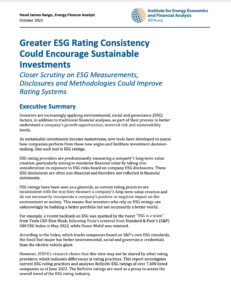Full Title: Greater ESG Rating Consistency Could Encourage Sustainable Investments
Author(s): Hazel James Ilango
Publisher(s): Institute for Energy Economics and Financial Analysis
Publication Date: October 10, 2022
Full Text: Download Resource
Description (excerpt):
Investors are increasingly applying environmental, social and governance (ESG) factors, in addition to traditional financial analyses, as part of their process to better understand a company’s growth opportunities, material risk and sustainability levels. As sustainable investments become mainstream, new tools have developed to assess how companies perform from these new angles and facilitate investment decisionmaking. One such tool is ESG ratings.
ESG ratings have been seen as a gimmick, as current rating practices are inconsistent with the way they measure a company’s long-term value creation and do not necessarily incorporate a company’s positive or negative impact on the environment or society. This means that investors who rely on ESG ratings can unknowingly be building a better portfolio but not necessarily a better world.
The report makes some recommendations to address issues with ESG including the adoption of universally accepted ESG disclosure frameworks, more transparent ESG rating methodology disclosure by rating providers, a standardized and specific definition of ESG rating, and prioritizing impact materiality integration in ESG data reporting and rating, among other considerations.
